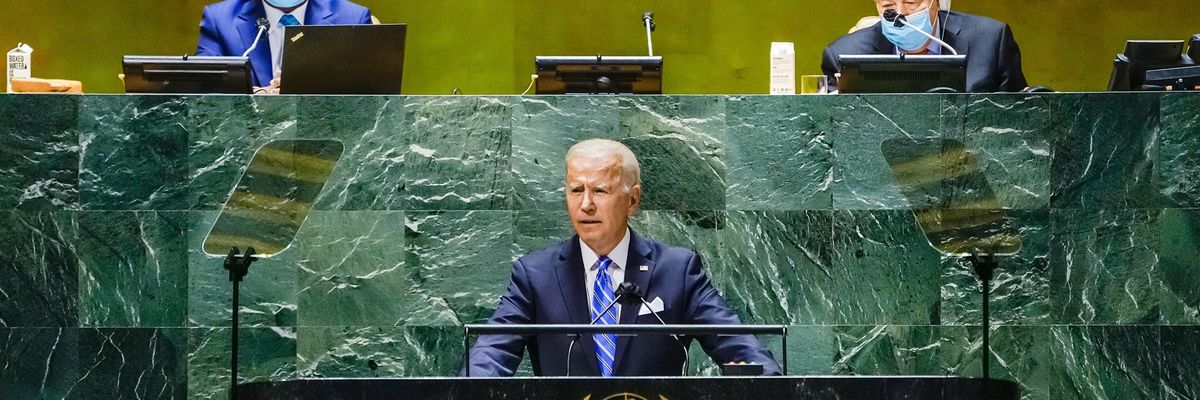While approval of both the United States and the health of its democracy has reached its highest point abroad in the last four years, Washington’s globe-spanning military infrastructure is generally not seen in such a favorable light, according to a new survey of public opinion in nine key countries released Thursday by the Eurasia Group Foundation.
The report, which was based on responses to several foreign policy-related questions by nearly 5,000 respondents between the end of April and mid-May, found that President Biden appears to have made some headway in restoring Washington’s international image over the previous three years that EGF has polled the same countries.
“Most respondents (60%) think American democracy sets a positive example for the world and about half (53%) think their own system of government should be more like that of the United States,” according to the report. It also noted that about three-quarters of all respondents said their country would be better off if the United States, rather than China, was “the world’s leading power.”
The report found major differences, however, in respondents’ views in different countries. The nine countries covered by the survey included Mexico and Brazil in Latin America, Poland and Germany in Europe, Nigeria and Egypt on the African continent, and India, China, and Japan in Asia.
Respondents in Brazil, Poland, Nigeria, and India, for example, tended to express more favorable views of the United States and its democracy compared to Mexico, Germany, Japan, Egypt, and China. The report also noted that Washington’s treaty allies — Brazil, Germany, Poland, and Japan — indicated less favorable opinions of American democracy than those countries don’t have such a relationship.
And while the strong majority of respondents overall preferred U.S. leadership and six in ten believe that the United States is responsible for “maintaining international stability,” nearly half (47 percent) viewed the presence of U.S. military bases in their region as a “threat to their independence,” the highest percentage that EGF polls have found in the last four years. Leading the latter group was China (70 percent), India (65 percent), Egypt (62 percent) and Mexico (49 percent).
And U.S. “soft power” — in the form of its cultural exports, trade more generally, and support for non-governmental organizations — gained more approval than military activity and sales overseas. “What we find is that American soft power is viewed more positively than American hard power,” Zuri Linetsky, one of the report’s co-authors, told Responsible Statecraft. “We find more support for the power of the American example than the example of American power,” he added.
Particularly notable in that regard, according to the report, was the strong overall approval of Biden’s decision last summer to withdraw U.S. military forces from Afghanistan. Forty-nine percent of respondents said they approved of the withdrawal versus only 20 percent who opposed.
Similarly, 52 percent of respondents said they approved of Washington’s handling of the Russian invasion of Ukraine against only 19 percent who disapproved (although a plurality in China disapproved). Asked why they approved, avoiding a direct U.S.-Russian war and preventing the suffering of Ukrainians were most often cited. Least often cited were “defending democracies from autocracies” and “punishing Russia for its aggression.”
In that respect, Linetsky suggested that Biden’s emphasis on dividing countries between democracies and autocracies may be counterproductive. Asked what they considered the “most significant threat to international security,” only 12 percent of all respondents cited “authoritarianism,” well behind the other four options, including the spread of nuclear weapons (29 percent), terrorism and violent extremism (23 percent), great-power competition (22 percent), and climate change (14 percent).
“We’re trying to get a better sense of how the United States can best interact with other countries,” according to Linetsky. “Maybe the authoritarian/democratic framing is not the best.”
The survey found that several factors tended to contribute to more favorable views of the United States. Older respondents generally responded more positively, as did better educated respondents. Respondents with close friends or relatives living in the United States and those who had actually visited tended to have much more favorable views than those without such connections.
Asked whether U.S. military collaboration with their country had a positive or negative impact, Egyptians respondents were the most negative by far (64 percent). The most positive were respondents in Poland (80 percent positive), India (79 percent), Nigeria (73 percent), and Brazil (56 percent).
Egyptian respondents were also the most negative about the impact of American cultural products, including movies, music, and television. Nearly two-thirds of Egyptians said they had a negative impact. Majorities in all other countries surveyed reported positive impacts by solid majorities, including 84 percent of respondents in Brazil, 82 percent of Indian respondents, 77 percent of Nigerians, 75 percent of Poles, 69 percent of Mexicans, 60 percent of Germans, and 59 percent of Chinese.
Majorities of respondents in six of the ten countries said they would “like to see (their) system of government become more like that of the United States,” led by Nigeria (85 percent), Brazil (77 percent), India (71 percent), Poland (65 percent), and Egypt (57 percent). Majorities in China, Japan ,and Germany, on the other hand, indicated they were either neutral or wanted their governments to be less like that of the U.S.
The survey was conducted through the internet, and respondents tended to be relatively well-educated and employed. The sample included 757 and 768 respondents from China and India, respectively; In the other seven countries, it included 495 respondents.















